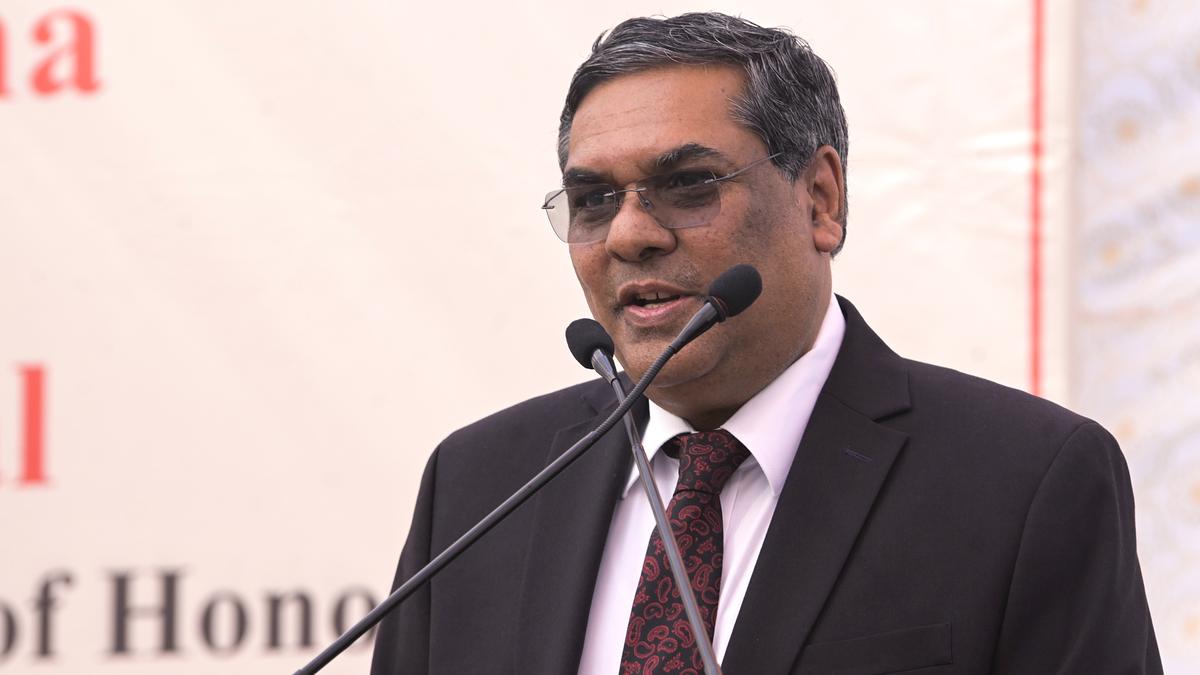 |
|
The article presents a multifaceted perspective on the Indian judiciary, sparked by an event celebrating 75 years of the Constitution. The Chief Justice of India (CJI), Sanjiv Khanna, emphasizes the judiciary's unique position due to its direct connection with the people, highlighting its accessibility compared to the legislature and executive branches. However, this optimistic view is challenged by Justice A.S. Oka, a senior Supreme Court judge, who questions the widely held belief that the common person has unwavering faith in the judiciary. Justice Oka points to the staggering number of pending cases in district courts – 4.55 crore, with 25-30% lingering for over a decade – as evidence that undermines the claim of public trust. This divergence in opinions from within the judiciary itself sets the stage for a critical examination of the system's strengths and weaknesses. The Solicitor General, Tushar Mehta, introduces a different dimension to the discussion by advocating for the re-Indianization of jurisprudence. He argues that instead of relying on foreign legal models, India should develop a legal framework uniquely suited to its own conditions, character, temperament, and social ethos. Mehta also highlights the need for Indian legal minds and thinkers to be given proper recognition and for the full breadth of Indian legal heritage to be incorporated into the practice of law. Finally, Mehta addresses the impact of social media and emerging technologies on jurisprudence, suggesting that the legal system must adapt to the new modes and methods of communication arising from these advancements, especially considering the potential for misuse through deep fakes and misinformation. The debate surrounding the judiciary's role in society is complex and multifaceted, encompassing issues of accessibility, efficiency, cultural relevance, and technological adaptation.
Justice Oka's critique of the judiciary's perceived infallibility is particularly poignant. The sheer volume of pending cases, especially those that have been unresolved for over a decade, paints a grim picture of the delays and inefficiencies within the system. These delays can have profound consequences for individuals and businesses, undermining their faith in the legal process and potentially denying them justice. While the CJI focuses on the judiciary's accessibility, Justice Oka highlights the fact that accessibility alone is not sufficient. If the legal system is bogged down by delays and backlogs, it may be accessible in principle but inaccessible in practice. The lengthy wait times can discourage people from seeking legal recourse, effectively denying them their right to justice. This raises fundamental questions about the judiciary's capacity to effectively serve the needs of the people. Are there systemic issues that contribute to the backlog of cases? Are there sufficient resources allocated to the judiciary? Are there reforms needed to streamline the legal process and improve efficiency? Addressing these questions is crucial to restoring public trust in the judiciary and ensuring that it remains a vital pillar of Indian democracy.
The Solicitor General's call for the re-Indianization of jurisprudence is a significant departure from the prevailing trend of adopting Western legal models. He argues that India should develop a legal framework that is rooted in its own cultural context and reflects its unique values and traditions. This argument is based on the premise that law is not a universal concept but is rather shaped by the specific social, economic, and political realities of a given society. By drawing inspiration from its own legal heritage, India can create a system that is more responsive to the needs of its people and more effective in addressing its challenges. The re-Indianization of jurisprudence also involves recognizing and celebrating the contributions of Indian legal minds and thinkers who have been overlooked in the past. By incorporating their ideas and perspectives into the legal framework, India can enrich its understanding of law and justice and create a more nuanced and culturally sensitive legal system. This approach requires a critical examination of existing laws and legal practices to identify areas where they can be better aligned with Indian values and traditions. It also requires a commitment to promoting legal education and research that is grounded in the Indian context.
The emergence of social media and artificial intelligence presents both opportunities and challenges for the Indian judiciary. On the one hand, these technologies can be used to improve access to justice, streamline legal processes, and enhance the efficiency of the court system. For example, social media platforms can be used to disseminate legal information, provide online legal assistance, and facilitate communication between lawyers and clients. Artificial intelligence can be used to automate routine tasks, analyze legal documents, and identify patterns in case data. On the other hand, social media and artificial intelligence also pose new threats to the rule of law. The spread of misinformation and disinformation through social media can undermine public trust in the judiciary and create confusion about legal rights and responsibilities. The use of deep fakes and other forms of manipulated media can be used to distort evidence and influence legal outcomes. Therefore, the Indian judiciary must adapt to these new technologies and develop strategies to mitigate the risks they pose. This requires a combination of legal reforms, technological safeguards, and public education initiatives. It also requires a commitment to ethical and responsible use of these technologies within the legal system.
In conclusion, the article highlights the complex and evolving nature of the Indian judiciary. While the CJI emphasizes the judiciary's accessibility, Justice Oka challenges the notion of unwavering public trust, pointing to the significant backlog of pending cases. The Solicitor General advocates for the re-Indianization of jurisprudence, arguing for a legal framework that is rooted in Indian values and traditions. He also underscores the need for the judiciary to adapt to the challenges and opportunities presented by social media and artificial intelligence. These diverse perspectives underscore the importance of ongoing dialogue and reform within the Indian legal system to ensure that it remains a vital pillar of democracy and serves the needs of the people.
